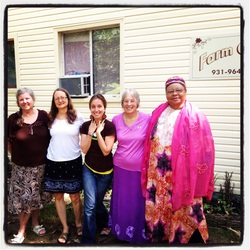 I'm not here to scare you, and you're probably already aware that in the 1950's and 60's, birth wasn't a kind animal to women. The medical industry was very excited about various "advances" in technology that left women completely out of their own birth experiences. In addition to using full anesthesia, surgeons often used forceps to deliver babies of first time mothers. This was based on bad science and I'm so grateful that we live in the world we do now, where forceps are truly reserved for times of absolute necessity. Sometime in the late sixties, a woman named Ina May Gaskin was thrilled to give birth to her first child. Determined to be a "good patient" and avoid pain medication and forceps, she stayed perfectly quiet all through her labor and tried not to attract attention. Unfortunately for her, it didn't matter. She received an episiotomy, a forceps delivery, and was separated from her baby for the first 24 hours of her life because that was the standard protocol at the time. Rather than submitting to the "standard protocol" for her subsequent births, she looked beyond the latest and greatest evidence and back in time to the way that women have been birthing their babies for millennia: at home, surrounded with like-minded women. She found a woman (Joanne Santana, pictured on the left) who had birthed a baby at home with the help of a midwife. This was the spark that she needed to set fire to the establishment of torturous birth. She and her sister-friends started a commune in Tennessee that was founded on hippie ideals like peace, love, and empowerment. For forty years now these women have salvaged the vestiges of midwifery and rekindled the practice of woman-centered birth. I spent the last seven days learning from these midwives, hearing their stories, and soaking up their strange blend of spirituality and sisterhood, and I am forever changed. Midwifery is good science with boundaries, reason, heart, and history. It offers women support to birth their babies and respects the need for intervention and surgery for those outside of those bounds. Rest assured, this is not me recommending home birth to everyone. Instead, this is me encouraging you to read Ina May's books and discover a softer side of birth. Ina May's Guide to Childbirth, Ina May's Guide to Breastfeeding, and Spiritual Midwifery. I wish for you inspiration, empowerment, peace and love in your prenatal care and birthing experience. I know this is possible. Do you?
0 Comments
Leave a Reply. |
About meI'm one of those people who loves making your life easier (and I believe in you). I am an experienced registered prenatal yoga teacher and a lactation educator. Want more? My monthly newsletter might be for you.
Archives
April 2014
Categories
All
|
 RSS Feed
RSS Feed
